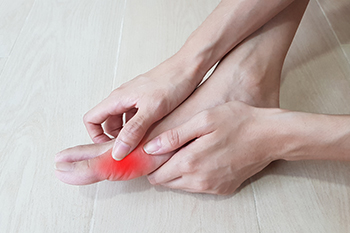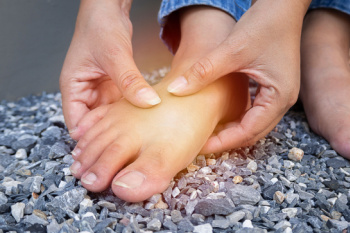

Bunion surgery is designed to alleviate pain and correct the misalignment caused by bunions. The procedure may involve several techniques depending on the severity and specific characteristics of the bunion. Exostectomy is the removal of the bony bump, while osteotomy realigns the bones of the toe to correct its position. Arthrodesis, or fusion surgery, involves joining two bones in the toe to stabilize the joint and reduce pain. Resection arthroplasty removes the damaged joint and reshapes the bones to improve function. Post-surgery, you can expect a recovery period involving rest, wearing special footwear, and gradual rehabilitation exercises. If you have a bunion that is causing discomfort, it is suggested that you consult a podiatrist who can determine if surgery is right for you.
Foot surgery is sometimes necessary to treat a foot ailment. To learn more, contact one of our podiatrists of Grand Blanc Family Footcare. Our doctors will assist you with all of your foot and ankle needs.
When Is Surgery Necessary?
Foot and ankle surgery is generally reserved for cases in which less invasive, conservative procedures have failed to alleviate the problem. Some of the cases in which surgery may be necessary include:
What Types of Surgery Are There?
The type of surgery you receive will depend on the nature of the problem you have. Some of the possible surgeries include:
Benefits of Surgery
Although surgery is usually a last resort, it can provide more complete pain relief compared to non-surgical methods and may allow you to finally resume full activity.
Surgical techniques have also become increasingly sophisticated. Techniques like endoscopic surgery allow for smaller incisions and faster recovery times.
If you have any questions please feel free to contact our office located in Grand Blanc, MI . We offer the newest diagnostic and treatment technologies for all your foot and ankle needs.

In the restaurant industry, wearing non-slip shoes are essential for workers, ensuring safety and preventing accidents. These shoes are designed with specialized outsoles that provide superior traction on slippery surfaces, such as spills or grease. A key feature of non-slip shoes is their rubber or polyurethane soles, which are engineered to grip various floor types effectively. The tread patterns on these soles are often designed to channel liquids away from the foot, reducing the risk of slips and falls. Additionally, the material of the sole plays a significant role in maintaining stability. If you have injured your foot during your work day, it is suggested that you visit a podiatrist who can treat various foot conditions, and educate you on what type of shoes to wear for your job.
While working on the feet, it is important to take the proper care of them. For more information about working on your feet, contact one of our podiatrists from Grand Blanc Family Footcare. Our doctors will treat your foot and ankle needs.
Working on Your Feet
Standing on your feet for long periods of time can cause stress and pain in your feet. Your whole body may experience change in terms of posture, back pain, bunions, callouses and or plantar warts. There are ways to avoid these conditions with proper foot care, smart choices and correct posture.
Positive Changes
Negative heeled shoe – Choosing this shoe type places the heel slightly lower than the ball of the foot. These are great for overall foot health. Find shoes that fit you correctly.
Go barefoot – Our feet were not designed to be enclosed for all hours of the day. Try to periodically expose your feet to air.
Eliminate Pain
Foot Exercises – Performing simple exercises, incorporating yoga and doing stretches are beneficial. This will allow increased blood flow to the area and muscles of the foot.
Achilles tendon – Stretching the foot out flat on the floor will relax the calf muscles and tendon. These exercises can be performed almost anywhere. Make sure you add these exercises to your daily regimen.
With a little bit of this information and knowing more about foot health, you will notice changes. Foot stretches and proper footwear will help with pain and prevent further issues.
If you have any questions please feel free to contact our office located in Grand Blanc, MI . We offer the newest diagnostic and treatment technologies for all your foot and ankle needs.

Gout is a form of arthritis that often targets the big toe, causing sudden, intense pain, swelling, and redness in the joint. This happens when uric acid crystals build up in the joints, leading to inflammation. During a gout attack, the affected joint, especially the big toe, can become extremely painful, making even light contact unbearable. Treatment focuses on relieving the pain and inflammation quickly, usually with medications like NSAIDs, colchicine, or steroids. These are most effective when taken as soon as the attack begins. To prevent future flare-ups, a podiatrist may prescribe medication that lowers uric acid levels in the blood, helping to dissolve the crystals and prevent new ones from forming. Restricting intake of certain foods that contribute to uric acid build up is also important. A podiatrist can diagnose gout and offer effective treatments to manage both the immediate pain and long-term prevention. If you are experiencing pain from gout, it is suggested that you schedule an appointment with a podiatrist.
Gout is a painful condition that can be treated. If you are seeking treatment, contact one of our podiatrists from Grand Blanc Family Footcare. Our doctors will treat your foot and ankle needs.
What Is Gout?
Gout is a form of arthritis that is characterized by sudden, severe attacks of pain, redness, and tenderness in the joints. The condition usually affects the joint at the base of the big toe. A gout attack can occur at any random time, such as the middle of the night while you are asleep.
Symptoms
Risk Factors
Prior to visiting your podiatrist to receive treatment for gout, there are a few things you should do beforehand. If you have gout you should write down your symptoms--including when they started and how often you experience them, important medical information you may have, and any questions you may have. Writing down these three things will help your podiatrist in assessing your specific situation so that he or she may provide the best route of treatment for you.
If you have any questions, please feel free to contact our office located in Grand Blanc, MI . We offer the newest diagnostic and treatment technologies for all your foot care needs.

Erythromelalgia is a rare condition resulting in intense burning pain, redness, and warmth in the feet, often triggered by heat, exercise, or stress. This condition occurs due to abnormal blood flow and increased skin temperature in the affected areas, which leads to discomfort that can be severe and debilitating. The exact cause of erythromelalgia is not always clear, but it may be linked to nerve damage or blood vessel abnormalities. In some cases, it is associated with other medical conditions, such as autoimmune disorders or blood diseases. Symptoms include episodes of severe burning pain, redness, and swelling in the feet, which may last from minutes to hours. These episodes can be unpredictable, causing significant disruption to daily life. Diagnosis is usually made based on symptoms and clinical examination, sometimes supported by tests to rule out other conditions. Treatment focuses on managing symptoms, often through cooling measures, medications, and in some cases, addressing underlying conditions. If you are suffering from any of the symptoms described, it is strongly suggested that you visit a podiatrist for care.
When dealing with systemic disease of the feet, it is extremely important to check the affected areas routinely so that any additional problems are caught quickly. If you have any concerns about your feet and ankles contact one of our podiatrists from Grand Blanc Family Footcare. Our doctors will assist you with all of your podiatric needs.
Systemic Diseases of the Feet
Systemic diseases affect the whole body, and symptoms usually are displayed in the feet. This condition can make a patient’s ability to walk unbearable. Systemic diseases include gout, diabetes mellitus, neurological disorders, and arthritis.
Gout – is caused by an excess of uric acid in the body. Common symptoms include pain, inflammation, and redness at the metatarsal/phalangeal joint of the base big toe. Gout can be treated by NSAIDs to relieve pain and inflammation, and other drugs that lower the acid levels in the body.
Diabetes mellitus – is an increase in the level of blood sugar that the body cannot counteract with its own insulin. Failure to produce enough insulin is a factor in Diabetes.
Diabetes of the Feet
Diabetic Neuropathy – may lead to damaged nerves and affect the feet through numbness and loss of sensation.
Peripheral Vascular Disease – can restrict the blood flow to the feet, and often times lead to amputation of the feet.
If you have any questions please feel free to contact our office located in Grand Blanc, MI . We offer the newest diagnostic and treatment technologies for all your foot and ankle needs.